by Fred Hills
Few things are more important to the prosperity of our community than our educational systems. As citizens, it is our responsibility to keep up to date on the state of those systems, but that is sometimes difficult to do. Where can you get objective information about how well the schools systems are performing? How can a “lay” person get in depth information about some of the important decisions being made that have the potential to affect our children and our economic prospects? How can we get that information we need to be informed, responsible parents, teachers and community members when it comes to education? Fortunately, an opportunity is on the horizon to help us do just that.
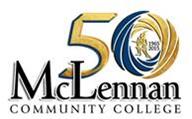 The Heart of Texas P-20 Council & Prosper Waco are cohosting this year’s State of Education in the Heart of Texas on Tuesday, April 19 from 11 AM to 1:30 PM at the McLennan Community College Conference Center. The community is invited.
The Heart of Texas P-20 Council & Prosper Waco are cohosting this year’s State of Education in the Heart of Texas on Tuesday, April 19 from 11 AM to 1:30 PM at the McLennan Community College Conference Center. The community is invited.
The forum will provide statistics and information on the progress of local educational efforts followed by panel discussions giving students, industry partners and educational leaders the opportunity to share their perspectives on education in central Texas. Prosper Waco will also share their ongoing efforts in bringing together collaborating partners from the greater Waco area in cooperatively addressing educational issues in our community.
We are honored to have Texas’s House Representative Jimmie Don Aycock as our lunch keynote speaker. Rep Aycock represents District 54 and currently serves as the chair of the Public Education Committee and a member of the Defense & Veterans’ Affairs Committee. He will share his perspectives on educational policy in Texas.
The agenda is as follows:
- 11:00-11:10 a.m.: Introduction by Fred Hills, Heart of Texas P-20 Council and Matthew Polk, Executive Director of Prosper Waco
- 11:10-11:30 a.m.: Presentation: Statistics of Education in the Heart of Texas
- 11:30-11:50 a.m.: Industry Panel Discussion
- 11:50-12:10 p.m.: Student Panel Discussion
- 12:10-1:00 p.m.: Lunch & Keynote Speaker, Rep. Jimmie Don Aycock
- 1:00-1:30 p.m.: Updates from the Heart of Texas P-20 Council and Prosper Waco
Registration cost is $15 which includes lunch. All are invited and welcome to register at Region 12 ESC’s website txr12.escworks.net/catalog/search.aspx, Session #88565. If you have any questions about the forum, contact either Fred Hills at [email protected] or Chris Holecek at [email protected].
 Dr. Fred Hills is the current president of the HOT P-20 and Dean of Arts, Science and Business at McLennan Community College. He has worked and lived in the Waco community for over 20 years and has served on the HOT P20 for the last four years.
Dr. Fred Hills is the current president of the HOT P-20 and Dean of Arts, Science and Business at McLennan Community College. He has worked and lived in the Waco community for over 20 years and has served on the HOT P20 for the last four years.
By Rachel Toombs
(Note: This piece was originally published on Manyhorizons.com. )
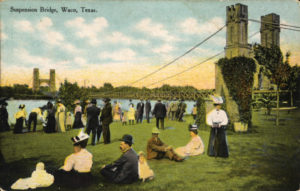 100 years ago, two miles from where my house now stands, seventeen-year-old Jesse Washington was lynched just outside the courthouse in downtown Waco, Texas.[1] What came to be deemed nationally as “The Waco Horror” was caught through gruesome images of Washington’s charred body hanging from a tree with a crowd of thousands in their Sunday-best encircling the scene. One of these images (warning: this image is graphic) captures the face of a young man smiling a benign smile that could just as well be made in a school photograph or at the sight of one’s crush on a first date. The smiling young man beams out from the bottom right corner of the image. Just to the left of him, there is a tree and hanging from it is the barely recognizable remains of a man.
100 years ago, two miles from where my house now stands, seventeen-year-old Jesse Washington was lynched just outside the courthouse in downtown Waco, Texas.[1] What came to be deemed nationally as “The Waco Horror” was caught through gruesome images of Washington’s charred body hanging from a tree with a crowd of thousands in their Sunday-best encircling the scene. One of these images (warning: this image is graphic) captures the face of a young man smiling a benign smile that could just as well be made in a school photograph or at the sight of one’s crush on a first date. The smiling young man beams out from the bottom right corner of the image. Just to the left of him, there is a tree and hanging from it is the barely recognizable remains of a man.
It would be easy to stand apart from the appalling joy of this young man before such a horror. Evil is always easier to swallow when we are able to stand apart. It is a bit harder to stand apart when the evil occurred right down the street, but not all that hard. When I asked a class of undergraduates who also live just a couple miles from the Waco Horror if they knew the name Jesse Washington, not one hand was raised. Not one. It is easy to stand apart from evil, even when it occurred right down the street unless you are on the receiving end of those evil acts.
It is worth taking a moment to state the obvious: those in positions of societal privilege are much less likely to recognize the evil in our midst and in ourselves. This is a kind privileged ignorance. When we find ourselves among the lynching crowd and not the lynched, the horror can be lost on us. And often is, as can be seen in the indelicacy of the proclamation that “all lives matter,” when it is the black body that is treated as though it matters less than a white one.
Now, our ability to stand apart is, of course, unsurprising. For “the heart really is deceitful above all things and beyond cure. Who can understand it?”[2] When I look at that picture of the young man in a crisp white shirt, I cannot understand it. When I allow myself to consider for that terrifying moment how I ignorantly and willfully participate in my own forms of perpetuating even delighting in evil, I cannot understand it. But I know it is true.
We like to see ourselves as part of the crowd that welcomed the God-Man into Jerusalem with palm branches signaling his triumphal entry into the holy city. We do not like to identify ourselves as the same crowd later that week who cried “Crucify him.” It is entirely fitting that often the ashes that streak our foreheads and initiate us into the Lenten season of the bruised heart are made from the ashes of the palms from Palm Sunday: behold your wickedness.
In his Summa Theologica, Thomas Aquinas notes what was accomplished in Christ’s Passion: “As Christ’s slayers were men, so also was the Christ slain. Now the charity of the suffering Christ surpassed the wickedness of His slayers. Accordingly Christ’s Passion prevailed more in reconciling God to the whole human race than in provoking Him to wrath.”[3] We are Christ’s slayers. Our wickedness is not minimized in the Passion event. Instead, Thomas emphasizes that Christ’s charity, his love, surpasses our wickedness. Our wickedness, seen not only in the mob that cried out “Crucify him” two thousand years ago but throughout the centuries and in my case down the street, must not be forgotten if we want to do justice to the Christ event. We can only grasp the profundity that Love came down, becoming one of us, being crucified by us, and raising both himself and us from the curse of death if we behold our wickedness that God’s love surpassed.
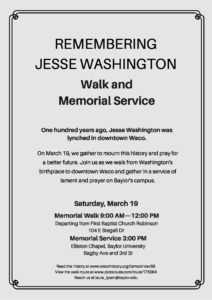 March 19 – REMEMBERING JESSE WASHINGTON: Memorial Walk and Service – On March 19, we come together as the communities and churches of Waco to mourn our history and pray for a better future. Join us as we walk in visible remembrance from Washington’s birthplace to downtown Waco and gather in a service of lament and prayer on Baylor’s campus. For more information, contact [email protected]. Read the history at www.wacohistory.org/items/show/55 or view the walk route (subject to revision) at www.plotaroute.com/route/175094. FLYER.
March 19 – REMEMBERING JESSE WASHINGTON: Memorial Walk and Service – On March 19, we come together as the communities and churches of Waco to mourn our history and pray for a better future. Join us as we walk in visible remembrance from Washington’s birthplace to downtown Waco and gather in a service of lament and prayer on Baylor’s campus. For more information, contact [email protected]. Read the history at www.wacohistory.org/items/show/55 or view the walk route (subject to revision) at www.plotaroute.com/route/175094. FLYER.
 Rachel Toombs is a third-year theology doctoral student in the Religion Department at Baylor University. She moved to Waco from Vancouver, BC, where she completed her MA in Old Testament. Before she started her graduate studies, she worked with at-risk youth in Minneapolis. Her academic interest is in the theological style of narrative, specifically in the Old Testament and contemporary literature. She lives in Waco with her husband and two pit-mix puppies. She is a diehard Twins fans, and remembers when the Dallas Stars were called the North Stars.
Rachel Toombs is a third-year theology doctoral student in the Religion Department at Baylor University. She moved to Waco from Vancouver, BC, where she completed her MA in Old Testament. Before she started her graduate studies, she worked with at-risk youth in Minneapolis. Her academic interest is in the theological style of narrative, specifically in the Old Testament and contemporary literature. She lives in Waco with her husband and two pit-mix puppies. She is a diehard Twins fans, and remembers when the Dallas Stars were called the North Stars.
The Act Locally Waco blog publishes posts with a connection to these aspirations for Waco. If you are interested in writing for the Act Locally Waco Blog, please email [email protected] for more information.
[1] For a more detailed accounts (warning: contain graphic images): http://www.wacohistory.org/items/show/55, http://www.npr.org/templates/story/story.php?storyId=5401868, https://tshaonline.org/handbook/online/articles/jcj01
[2] Jeremiah 17:9
[3] Sum IIIa. 49.4.ad.3
By Brandon Chappell
In recent days, I have been trying to find out what the perception of Texas State Technical College is from the students in the community, and I have been totally surprised at what I’ve heard. One student told me that he was under the impression that TSTC was strictly a place you go to when you want to work on cars. Another student told me that she wasn’t aware that females could even attend TSTC. Neither of these statements is true. TSTC offers a wide variety of associate degrees and certificates for both men and women and is considered by many as one of Waco’s best kept secrets.
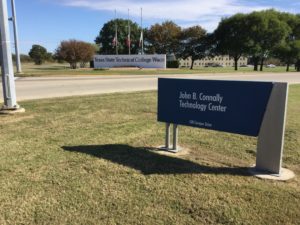 TSTC, formerly known as TSTI has been a part of educating and preparing students for the workforce in Waco for over 50 years. With an array of programs such as Gaming, Programming, Welding, Laser Optics, Building Construction, Culinary Arts, Web Design and many others TSTC, offers hands on education and experience locally at a very affordable price. All of the instructors at TSTC have experience working in their particular fields, so the knowledge and wisdom they offer the students is invaluable.
TSTC, formerly known as TSTI has been a part of educating and preparing students for the workforce in Waco for over 50 years. With an array of programs such as Gaming, Programming, Welding, Laser Optics, Building Construction, Culinary Arts, Web Design and many others TSTC, offers hands on education and experience locally at a very affordable price. All of the instructors at TSTC have experience working in their particular fields, so the knowledge and wisdom they offer the students is invaluable.
A lecture-style class is not for everyone and at TSTC, we appreciate and value a hands-on teaching environment. Aside from the instructors themselves, there are many services TSTC offers that help our students successfully graduate and find a job in their field. There are scholarships and grants that students can apply for to help pay for tuition and books. The students have access to Success Coaches, who are the academic advisors available 5 days a week to help students navigate any obstacles that comes between them and graduation.
Another service TSTC offers to students is the Project Link Program. Project Link is a program administered by Prosper Waco at TSTC and MCC that allows the students who are members of the program at La Vega High School and University High School to have their own personal Success Coach. My name is Brandon Chappell and I am the Project Link Liaison at TSTC. I help prospective Project Link students who are interested in enrolling in TSTC in the future with information about testing, admissions and other requirements dealing with pursuing a degree or completing a certificate program. If the Project Link students have any problems or concerns dealing with being successful at TSTC, I am their “go-to guy.” I offer a one-on-one mentoring environment, and access to the same support services that the other Success Coaches have, but I am given the opportunity to concentrate on a much smaller number of students and build on a level of familiarity with the students from the high school level.
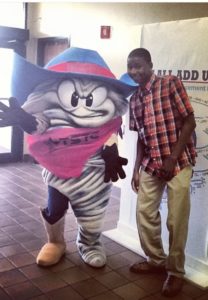 Come check out the TSTC Waco campus. Take a tour of some of the different departments and find out what program works for you. TSTC isn’t just for recent high school graduates; many of our students have been in the working world for several years before enrolling at TSTC. Most of our programs take 5 semesters or less to complete. If you’re not interested in earning a college degree, TSTC also offers certificate programs that can teach you the basic skills in many different trades so that you can broaden your horizons or make yourself more marketable in the workforce.
Come check out the TSTC Waco campus. Take a tour of some of the different departments and find out what program works for you. TSTC isn’t just for recent high school graduates; many of our students have been in the working world for several years before enrolling at TSTC. Most of our programs take 5 semesters or less to complete. If you’re not interested in earning a college degree, TSTC also offers certificate programs that can teach you the basic skills in many different trades so that you can broaden your horizons or make yourself more marketable in the workforce.
At TSTC our goal is to prepare our students for gainful employment, and we have an amazing placement rate. Ultimately the goal is to get our students out into the real world with the necessary job training and skills that it takes to work in many different industries.
The job market has been getting increasingly more competitive and TSTC can help even the playing for field or place you at the front of the hiring race. To find out more information about TSTC, visit www.tstc.edu or head over to the campus between 8-5 and one of our recruiters will be happy to give you a tour or answer any questions you may have.
 Brandon Chappell was raised in Houston, TX, but his roots are here in Waco. Most of his family were born here in Waco and graduated from local high schools. He attended Prairie View A&M University as a first generation college student. He graduated from PVAMU in 2012 with a Bachelor’s in Communication, and became the first male in his family to be awarded a college degree. He has been employed with Texas State Technical College since 2012 in several different positions and enjoys using his experiences to assist the students with being successful during their time in college.
Brandon Chappell was raised in Houston, TX, but his roots are here in Waco. Most of his family were born here in Waco and graduated from local high schools. He attended Prairie View A&M University as a first generation college student. He graduated from PVAMU in 2012 with a Bachelor’s in Communication, and became the first male in his family to be awarded a college degree. He has been employed with Texas State Technical College since 2012 in several different positions and enjoys using his experiences to assist the students with being successful during their time in college.
The Act Locally Waco blog publishes posts with a connection to these aspirations for Waco. If you are interested in writing for the Act Locally Waco Blog, please email [email protected] for more information.
by Jenuine Poetess
 There’s no denying that Spring is an inspiring season in Central Texas. Having grown up in the north where Spring was such an emotional event—hope, finally! after so much cold, ice, snow, and darkness—I never really put much stock in the changing of seasons in places like Texas. That is, until I lived here and experienced the sheer delight and joy of a riot of color as bluebonnets, Indian paint brushes, and primroses splash their vibrant adornments across the landscape.
There’s no denying that Spring is an inspiring season in Central Texas. Having grown up in the north where Spring was such an emotional event—hope, finally! after so much cold, ice, snow, and darkness—I never really put much stock in the changing of seasons in places like Texas. That is, until I lived here and experienced the sheer delight and joy of a riot of color as bluebonnets, Indian paint brushes, and primroses splash their vibrant adornments across the landscape.
So as robins with their plumb red bellies and beloved wildflowers are the harbingers of a Central Texas Spring, so too a calendar chock full of dynamic events is the artists’ first bloom of a new season!
 To kick off, the Heart of Texas Comic Con returns this weekend March 11-13th with artist vendors & live art-making on site, cosplay, food vendors, special guest appearances, and more there is something for comic lovers of every age! And be sure to stop by the Central Texas Artist Collective (CTAC) to say “hi!” to some of your favorite artists and community organizers living and creating in Waco!
To kick off, the Heart of Texas Comic Con returns this weekend March 11-13th with artist vendors & live art-making on site, cosplay, food vendors, special guest appearances, and more there is something for comic lovers of every age! And be sure to stop by the Central Texas Artist Collective (CTAC) to say “hi!” to some of your favorite artists and community organizers living and creating in Waco!
Also coming up this and next week are a number of Waco Poets Society (WPS) events including Nuestra Voz open mic on Saturday March 12th at 7:15pm at Rufi’s Cocina (which you may have seen in the most recent Waco Today!). Open mic is open to all creative expressions—poetry, story-telling, spoken-word, music, reflections, and more! On Tuesday March 15th, WPS is partnering with other artists to present Unsilent :: Survivor Stories, an evening of poetry & spoken word at 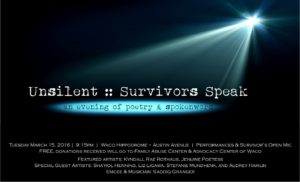 9:15pm at the Hippodrome on Austin Avenue in downtown Waco. This event is free and open to the public. There will be an opportunity to make a donation which will go to support the efforts of the Advocacy Center of Waco and the Family Abuse Center. In gratitude of the generosity of the Hippodrome donating their space for the event, attendees are encouraged to purchase concession items as a way to support our local business and make sustainable such partnerships between venue and programming! This event will have limited open mic spaces so please arrive at 9:15pm if you are interested in signing up to share 1 piece (2 minutes maximum).
9:15pm at the Hippodrome on Austin Avenue in downtown Waco. This event is free and open to the public. There will be an opportunity to make a donation which will go to support the efforts of the Advocacy Center of Waco and the Family Abuse Center. In gratitude of the generosity of the Hippodrome donating their space for the event, attendees are encouraged to purchase concession items as a way to support our local business and make sustainable such partnerships between venue and programming! This event will have limited open mic spaces so please arrive at 9:15pm if you are interested in signing up to share 1 piece (2 minutes maximum).
If you have things to share and were not able to get on the list at Unsilent, the next WPS open mic will be Thursday March 17th at Tea2Go Waco-Baylor on S. 7th street with sign-ups opening at 7:15pm. Again, this venue is open to music, poetry, story-telling, spoken-word, reflections, and more!
 This Saturday March 12th also marks the deadline for all art submissions for the annual Art on Elm neighborhood arts festival in East Waco Saturday April 9th from 10am-5pm. With live music, artist vendors, juried art exhibit, art activities, live art-making, food trucks and vendors this event is FREE and open to the public of all ages. Bring your friends, your family, your neighbors, and your funds to support local artists and enjoy the thriving creative culture Waco is growing! If you are an emerging artists looking to take the next step into exhibiting and selling your artwork, have a conversation with Angie or Steve Veracruz of CTAC; they will support you through the process and provide you with all the details and tools you need to soar! (Be sure to ask them about Paper Shoes the next time you see them!)
This Saturday March 12th also marks the deadline for all art submissions for the annual Art on Elm neighborhood arts festival in East Waco Saturday April 9th from 10am-5pm. With live music, artist vendors, juried art exhibit, art activities, live art-making, food trucks and vendors this event is FREE and open to the public of all ages. Bring your friends, your family, your neighbors, and your funds to support local artists and enjoy the thriving creative culture Waco is growing! If you are an emerging artists looking to take the next step into exhibiting and selling your artwork, have a conversation with Angie or Steve Veracruz of CTAC; they will support you through the process and provide you with all the details and tools you need to soar! (Be sure to ask them about Paper Shoes the next time you see them!)
If you’re looking for some music to enrich your palette, consider taking in a concert with the Waco Symphony Orchestra. On Saturday, March 19th, they will feature 16-year-old violin prodigy Fiona Shea who will join the WSO to perform Mendelssohn’s Concerto for Violin & Orchestra and the Waco Symphony Youth Orchestra–celebrating their 25th Anniversary. Tickets are available for purchase here.
Live theater may be more your style and if so, check out the Waco Civic Theater’s Spring production of The Great Gatsby…make a swanky evening of it and dress up in your own best attire. To stay up-to-date on the season or to learn about how you can audition for their next show, please visit WCT’s site here.
Maybe you’re more interested in kicking back in a casual setting with some good food and drinks and a great band. If so, check out the Spring line-up on stage at The Backyard and Common Grounds. Throughout this Spring, the Waco Hippodrome also has some live music offerings, as well as free film screenings–from the silly to the serious, and other performances to engage audiences of all ages.
 To get you ready for all the excitement of Art on Elm, head out to Waco’s Downtown Heritage Square for the 2nd Annual Food Truck Showdown on Saturday April 2nd. Tickets and full schedule of all the delicious offerings and events are available here. Gates open at 10am and be sure to bring your appetite! There will of course be a food truck showdown/competition, live music, artist vendors, concert, and sunset screening outdoor movie! What a generous portion of goodies to savor!
To get you ready for all the excitement of Art on Elm, head out to Waco’s Downtown Heritage Square for the 2nd Annual Food Truck Showdown on Saturday April 2nd. Tickets and full schedule of all the delicious offerings and events are available here. Gates open at 10am and be sure to bring your appetite! There will of course be a food truck showdown/competition, live music, artist vendors, concert, and sunset screening outdoor movie! What a generous portion of goodies to savor!
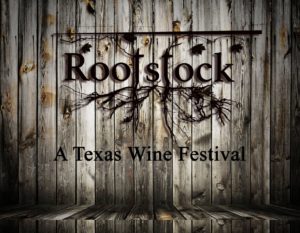 And while you’re digesting this buffet of soul-nourishing and taste-bud pleasing offerings Waco is dishing up, mark your calendars for the Rootstock Texas Wine Festival on Saturday April 23rd put on by the Valley Mills Vineyards at Indian Spring Park. This event will include tastings from 14 Central Texas wineries to be followed by a special VIP dinner featuring the culinary artworks of Milo Biscuit Company! To purchase tickets for the day or festival and VIP dinner please visit here.
And while you’re digesting this buffet of soul-nourishing and taste-bud pleasing offerings Waco is dishing up, mark your calendars for the Rootstock Texas Wine Festival on Saturday April 23rd put on by the Valley Mills Vineyards at Indian Spring Park. This event will include tastings from 14 Central Texas wineries to be followed by a special VIP dinner featuring the culinary artworks of Milo Biscuit Company! To purchase tickets for the day or festival and VIP dinner please visit here.
So whether you are an artist, a patron, an admirer, or one who simply enjoys delicious sights, sounds, and savors there is something to inspire everyone. Let us know how you’ll be enjoying the arts in Waco this Spring!
 Jenuine Poetess is an artist, visionary, and community organizer. In 2010, she founded In the Words of Womyn (ITWOW), an international, grass-roots, written and spoken-word arts project with chapters throughout Los Angeles, CA; Waco, TX; and Lebanon. Jenuine is the founder of Waco Poets Society and co-founder of the Central Texas Artist Collective. She writes, organizes, and creates rooted in the fierce conviction that holding intentional space, access, and opportunity for all people to foster their creative health is a matter of justice and is a vital asset to the sustainable thriving of communities. She currently lives and poems in Central Texas where she enjoys finding new ways to disrupt the homeostasis of her city. You can contact her at: j[email protected].
Jenuine Poetess is an artist, visionary, and community organizer. In 2010, she founded In the Words of Womyn (ITWOW), an international, grass-roots, written and spoken-word arts project with chapters throughout Los Angeles, CA; Waco, TX; and Lebanon. Jenuine is the founder of Waco Poets Society and co-founder of the Central Texas Artist Collective. She writes, organizes, and creates rooted in the fierce conviction that holding intentional space, access, and opportunity for all people to foster their creative health is a matter of justice and is a vital asset to the sustainable thriving of communities. She currently lives and poems in Central Texas where she enjoys finding new ways to disrupt the homeostasis of her city. You can contact her at: j[email protected].
The Act Locally Waco blog publishes posts with a connection to these aspirations for Waco. If you are interested in writing for the Act Locally Waco Blog, please email [email protected] for more information.
by Amy Grace
March is Red Cross month! That time of year in which we—along with community leaders, partners and volunteers—recognize how the American Red Cross helps people down the street, across the country and around the world. In celebration of that, I will be sharing some personal experiences and thoughts about the Red Cross each week.
When I was in my teens and early 20’s, I was a lifeguard, lifeguard instructor and swimming instructor, and as such, I had all the requisite certifications including Red Cross CPR, First Aid, etc. While I won’t be sharing my exact age today, let’s just say those lifeguarding days were quite a while ago!
But last ye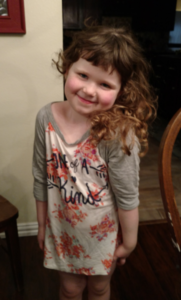 ar, my 4-year old daughter and I were eating dinner in our living room on Valentine’s Day, sharing a beef and broccoli dish from a local restaurant, when my little one choked on a piece of meat. Her airway was completely blocked, and if I had called 9-1-1, there would have been very little chance of the EMTs getting to our house in time to save her life. Instantly, all those years of Red Cross CPR and First Aid training kicked in and I jumped into action, performing the Heimlich maneuver and literally saving my daughter’s life. This Valentine’s Day was a very precious and poignant one, remembering how close I came to losing my little Valentine a year ago. But thanks to the Red Cross, she is still with me and thriving.
ar, my 4-year old daughter and I were eating dinner in our living room on Valentine’s Day, sharing a beef and broccoli dish from a local restaurant, when my little one choked on a piece of meat. Her airway was completely blocked, and if I had called 9-1-1, there would have been very little chance of the EMTs getting to our house in time to save her life. Instantly, all those years of Red Cross CPR and First Aid training kicked in and I jumped into action, performing the Heimlich maneuver and literally saving my daughter’s life. This Valentine’s Day was a very precious and poignant one, remembering how close I came to losing my little Valentine a year ago. But thanks to the Red Cross, she is still with me and thriving.
Those classes were and are provided to the public through our Preparedness and Health & 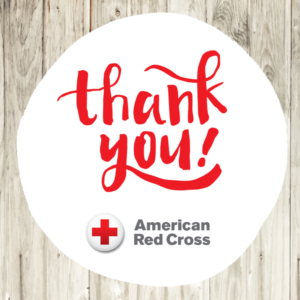 Safety Services teams, including babysitting classes, instructor certification classes, and so, so much more. Are you equipped to save a life in your own back yard, your pool, around your dinner table? You could be! Get into a class and learn how to be an everyday hero to the loved ones around you!
Safety Services teams, including babysitting classes, instructor certification classes, and so, so much more. Are you equipped to save a life in your own back yard, your pool, around your dinner table? You could be! Get into a class and learn how to be an everyday hero to the loved ones around you!
To find available classes, locations, costs, etc., visit us online at redcross.org/takeaclass.
 Amy Grace is a native Texan and is serving our community as the Executive Director of the Heart of Texas chapter of the American Red Cross. She has an extensive professional background but is most proud of being a mom to her incredible four-year old daughter and paying forward a legacy of courage, resilience, hope and abundance. She currently resides in Temple with her daughter, two canine family members (Ranger and Silver) and her grandmother.
Amy Grace is a native Texan and is serving our community as the Executive Director of the Heart of Texas chapter of the American Red Cross. She has an extensive professional background but is most proud of being a mom to her incredible four-year old daughter and paying forward a legacy of courage, resilience, hope and abundance. She currently resides in Temple with her daughter, two canine family members (Ranger and Silver) and her grandmother.
The Act Locally Waco blog publishes posts with a connection to these aspirations for Waco. If you are interested in writing for the Act Locally Waco Blog, please email [email protected] for more information.
by Rebecca Edwards
In Waco for Spring Break? You are in luck! There are some wonderful ways you can have some creative fun with your family – no matter what age they are! Here is my personal top 10 list. What would be on yours?
#10 The Dr. Pepper Museum with its Wild West Exhibit – Aside from all the history of Dr. Pepper, there is a great homage to the cowboys and cowgirls that have helped market the soda. Sweet treats in the oldfashioned soda fountain, too. On March 7th, the DPM begins its “summer” hours, meaning it’s open on Monday to Saturday 10am to 5pm and Sunday 12pm to 5pm. Admission is $8 for adults, $5 for students, Seniors & Military $7
#9 Cameron Park Zoo – (Be sure to take advantage of the zoo shuttle – the parking lot fills up quickly.) On Sunday, March 13th, 11am to 2pm, the zoo will host “Spring Forward for Amphibians” with special activities. But the rest of the week will be wonderful to walk the grounds and gaze at our animals living right here in the city! Playgrounds and the gift shop offer the weary some rest. The Zoo is open Monday through Saturday 9 am to 5 pm and Sunday 11 am to 5 pm. Admission is $10 for Adults, $7 for children 412 years old, $9 for Seniors (Children 3 and under are free and Military discounts are offered).
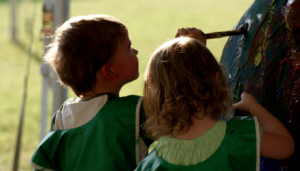 #8 Art Center Waco: GS DeFoore Exhibit, Cookies & Coloring, sculpture trail AND Spring Break Pottery Class – Okay, the Art Center is one of my favorite gems of Waco. Above Cameron Park and the river, the views are spectacular, the grounds (with walkable sculpture trail) are inspiring, and the gallery space is inviting and peaceful. Aside from the permanent structure of the Art Center itself, the goingson inside are also enticing. The GS DeFoore Exhibit just opened and will be up through May 27th. On Wednesday, March 9th, Doreen Plott of Mammoth Creek Pottery will be hosting a pottery class from 9am to noon. (Limited to 10, Registration $50). And on Friday, March 11th, free Cookies & Coloring will be back from 3pm to 5pm to explore the work of Jackson Pollock and eat cookies! What’s not to love??? The Art Center is open Tuesday through Saturday 10am to 5pm. Admission is FREE!!
#8 Art Center Waco: GS DeFoore Exhibit, Cookies & Coloring, sculpture trail AND Spring Break Pottery Class – Okay, the Art Center is one of my favorite gems of Waco. Above Cameron Park and the river, the views are spectacular, the grounds (with walkable sculpture trail) are inspiring, and the gallery space is inviting and peaceful. Aside from the permanent structure of the Art Center itself, the goingson inside are also enticing. The GS DeFoore Exhibit just opened and will be up through May 27th. On Wednesday, March 9th, Doreen Plott of Mammoth Creek Pottery will be hosting a pottery class from 9am to noon. (Limited to 10, Registration $50). And on Friday, March 11th, free Cookies & Coloring will be back from 3pm to 5pm to explore the work of Jackson Pollock and eat cookies! What’s not to love??? The Art Center is open Tuesday through Saturday 10am to 5pm. Admission is FREE!!
#7 Magnolia Silos and Food Trucks – In case you didn’t know, there’s a little HGTV show that has made Waco a destination city. And Magnolia Market at the Silos is its base camp! I like the store and all, but the “park” like feel of the grounds and the beauty of community are what have drawn me to the silos. The food trucks (looking at you, Luna Juice Bar and Club Sandwich) are a great excuse to drop by and have lunch while the kids run and tumble on the astroturf lawn with its old fashioned games. The store and grounds are open Monday to Thursday 10am to 6pm and Friday & Saturday 9am to 6pm. Closed Sunday. Admission is FREE!!
#6 Armstrong Browning Library at Baylor University – This grand library may be an odd suggestion for children on Spring Break, but the current exhibition of the library’s collection of children’s literature is worth checking out. The building itself is a masterpiece of architecture, and the grounds around Baylor are perfect for strolling, biking, or scootering. The library is open Monday through Friday, 9am to 5pm, and on Saturday 10am to 2pm. Admission is FREE!!
#5 THE Waco Hippodrome – If you haven’t checked out the beautiful renovations done to our Grand Old Dame, the Hippodrome is worth a visit. Offering firstrun movies, delightful old favorites, and a delicious menu (you can eat WHILE watching a movie), it should be pretty high on your list. Especially with the free concert coming up on March 7th at 7pm: The Air Force Celtic Band! Advanced tickets are available on the website—for FREE. (Did I mention this concert is free?) The Hippodrome offers lunch Monday through Friday 11am to 2pm, and the kitchen & bar are open Monday through Friday beginning at 5pm and Saturday and Sunday, beginning at 11am (for awesome brunch!). Admission for most movies and showtimes is $5, First run movies in the evening are $8.
#4 Mayborn Museum at Baylor University – Every. Single. Day. The Mayborn has special Spring Break activities planned in the Bill & Vera Daniel Historical Village every single day of the week. Monday is Chore Day, Tuesday is Grinding Day, Wednesday is Planting Day, Thursday is Candle Making, and Friday is Game Day! These activities are only from 1pm to 3pm in the village, with some days featuring a horsedrawn carriage or animals in the village. But if you miss that, don’t worry. The Mr. Potato Head & Tinker Toy exhibit are also worth the visit! Not to mention the chance to see DisneyPixar’s Toy Story in the museum theater at 11am and 3pm every day. AND Mr. Potato Head himself will make an appearance every day at 10:30 and 2:30. Aside from the traveling exhibits and special events, the regular exhibits are what keep our family members to this treasure of a museum. We like to feel small next to the mammoth skull and giant turtle skeleton in the Strecker wing. We like to explore the wonders of light and water and magnetism in the discovery rooms. And the museum store is a favorite spot to spend allowance money! The Mayborn is open from 10am to 5pm Monday through Saturday, with extended hours on Thursdays until 8pm. Open Sunday from 1pm to 5pm. Admission to the traveling exhibit includes regular admission Adults: $10.00, Children(18 months to 12 years of age): $5.00 Seniors (65 years and older): $9.00.
#3 The WacoMcLennan Public Library’s Spring Break Programming – From the time my oldest was a toddler, we have been taking advantage of the FREE programming at the Waco Library. Toddler time, Preschool Storytime, Summer showcases, special interest clubs. There is something for every age child. In fact, there are just too many to list here. Check out the library website for details about the Zooniversity visiting the South Waco Library or the Board Game club at the West Waco Library or the Family Kite Worksop at Central Library (preregister for that one!). And the regular programming isn’t letting up just because it is Spring Break! Toddler Time and Story Time are still happening! Plus, Books! Movies! Audiobooks! Free Wifi and computer use! Get a library card because it will take you places without having to actually travel. I am a HUGE fan. The Libraries are open most days from 10am to 6pm, with each branch having extended hours on certain days. Admission AND Library Cards are FREE!!!
#2 Sightseeing WacoTown’s Public Art – Waco is changing! It is becoming a place of vibrant art and culture—if it hasn’t always been, the cocoon is cracking. I want to encourage anyone to walk or bike along the Suspension Bridge and marvel at the Branding the Brazos sculptures that capture the scenes of the first crossings of our famous bridge. Find the Freedom Fountain at the Waco Convention Center and try to read the word “FREEDOM” in all the languages that surround it. Find our “You look Nice today, WacoTown” mural at 7th & Washington. Seek out our art. Support our artists at galleries like the Art Center of Waco, Anthem Studios, Art Forum, Martin Museum of Art, and Studio Gallery. See what artists have been doing in our city and celebrate! Go to the public art outside ANYTIME. For the art galleries, check their hours. Admission is FREE!!!
And the NUMBER ONE event in Waco during Spring Break is….
#1 FIRST FRIDAY!!! – Okay, so it doesn’t last all week, but it does start on the very first evening of Spring Break: Friday, March 4th! And the event is all over and really all afternoon and into the evening. Something for everyone and a chance (excuse?) to check out new places in town, like the Findery. Or maybe not even new ones—what about spots that have been around but there’s never been a chance to see what they are all about? Use this First Friday as a ticket to explore what downtown has to offer! Different venues have different hours. Admission is FREE!!!
 Rebecca Edwards grew up in West Texas and has lived in Waco for the better part of 24 years. After graduating from Baylor, she married Joel and they have three children. After careers in banking and travel, her titles now include Wife, Mother, Substitute Teacher, Photographer, Arts Enthusiast, and Craft Dabbler.
Rebecca Edwards grew up in West Texas and has lived in Waco for the better part of 24 years. After graduating from Baylor, she married Joel and they have three children. After careers in banking and travel, her titles now include Wife, Mother, Substitute Teacher, Photographer, Arts Enthusiast, and Craft Dabbler.
The Act Locally Waco blog publishes posts with a connection to these aspirations for Waco. If you are interested in writing for the Act Locally Waco Blog, please email [email protected] for more information.
By Christina Helmick
Earlier this month, the Prosper Waco added two new South Waco members to the Community Engagement Council. 1SG (retired) Leonard Montelongo Jr. and Sarah Guajardo, both born and raised in Waco, are grassroots community members who believe that by engaging the community, the Prosper Waco initiative will move forward with the community’s voice guiding the work.
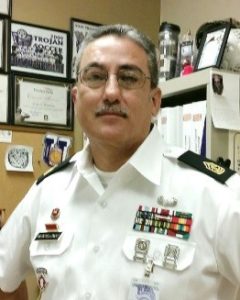 1SG (Ret.) Leonard Montelongo Jr. attended all Waco ISD schools growing up and is a graduate of University High School. He served in the United States Army just shy of 23 years and is currently the Senior Army Instructor for JROTC at University High School. He is a member of the American GI Forum and the American Legion of McLennan County. He earned his bachelor’s degree from National Louis University from McLean, Virginia.
1SG (Ret.) Leonard Montelongo Jr. attended all Waco ISD schools growing up and is a graduate of University High School. He served in the United States Army just shy of 23 years and is currently the Senior Army Instructor for JROTC at University High School. He is a member of the American GI Forum and the American Legion of McLennan County. He earned his bachelor’s degree from National Louis University from McLean, Virginia.
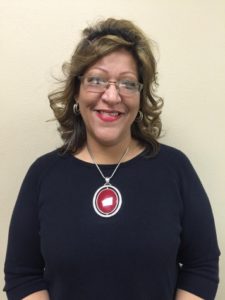 Sarah Guajardo is a lifelong resident of South Waco and graduated from University High School. She currently works as an administrative assistant at the Mercedes Benz of Waco. She received her certificates in secretarial training and medical secretary from McLennan Community College. Sarah currently serves as a member and former secretary of La Benemerita Sociedad Mutualista Mexicana De Jornaleros (Mutualista) and as a member of Mighty Wind Worship Center. While living in South Waco, she has served as president of Southern Little League and as a volunteer for the Heart of Texas Young Marines. Sarah is a proud mother of four and grandmother of two.
Sarah Guajardo is a lifelong resident of South Waco and graduated from University High School. She currently works as an administrative assistant at the Mercedes Benz of Waco. She received her certificates in secretarial training and medical secretary from McLennan Community College. Sarah currently serves as a member and former secretary of La Benemerita Sociedad Mutualista Mexicana De Jornaleros (Mutualista) and as a member of Mighty Wind Worship Center. While living in South Waco, she has served as president of Southern Little League and as a volunteer for the Heart of Texas Young Marines. Sarah is a proud mother of four and grandmother of two.
Both Leonard and Sarah, and the rest of Community Engagement Council, are actively engaging the community through house meetings and various community events. For example, Leonard and Sarah attended University High School’s Bootcamp event to connect with parents and talk with them about Prosper Waco’s Get Help Locally resource guide. The council also participated in the Central Texas Hispanic Chamber of Commerce’s Family Expo event held on Feb. 13. The Family Expo, which had more than 1,500 attendees, gave the Community Engagement Council the opportunity to meet, connect and interact with community members from all over the Waco area. The council is actively planning house meetings, which will allow residents of Waco to join small, intimate conversations to talk about the issues they face in their own community and about how as a community we can work to address the goals of the Prosper Waco initiative.
Needless to say, the Prosper Waco Community Engagement Council is working hard to make sure the community’s voice is guiding the work of the Prosper Waco initiative. If you’re looking for a way to have your voice heard or to get involved in the Prosper Waco initiative, contacting the Community Engagement Council is the way to go! Email [email protected] and someone from the council will email you back as soon as they can. You can also call 254-741-0081 and the Prosper Waco team will connect you to the Community Engagement Council member for the area of Waco you live in.
I’ll end with some thoughts from Ruth Graham, one of Prosper Waco’s East Waco Community Engagement Council members. Her thoughts below reflect on engaging the community in general, and how each of us can keep in mind how to best connect with those we are trying to serve.
“Change is possible. I’ve seen it firsthand. Results are achievable with the right ingredients. Who are we to expect them to change without changing our own mindsets? What are we exhibiting in our speed and body language to this group we’re offering to help? How do we listen to and engage those whom we do not know or possibly fear? Let us start with genuine sincerity. Let us add a heap of acceptance. Let us fill it with diversity. Let us roll in the lovely accents. Let us remix the color styles. Let the ingredients in us inspire the change for the results we desire to achieve.”
We’re social! Follow us on Facebook and Twitter to get the latest and greatest updates on the Prosper Waco initiative, the hard work our community partners are doing for Waco and the great work of the Prosper Waco Community Engagement Council!
 Christina Helmick is the director of communication at Prosper Waco. She is a recent graduate of Baylor University with a BA in Journalism, Public Relations & New Media. Originally she is from Washington, D.C., but has stayed in Waco post-graduation. She is an active mentor at J.H. Hines Elementary School, enjoys spending time with her family and watching Baylor football. Sic ’em Bears!
Christina Helmick is the director of communication at Prosper Waco. She is a recent graduate of Baylor University with a BA in Journalism, Public Relations & New Media. Originally she is from Washington, D.C., but has stayed in Waco post-graduation. She is an active mentor at J.H. Hines Elementary School, enjoys spending time with her family and watching Baylor football. Sic ’em Bears!
The Act Locally Waco blog publishes posts with a connection to these aspirations for Waco. If you are interested in writing for the Act Locally Waco Blog, please email [email protected] for more information.
by Alyssa Holloway
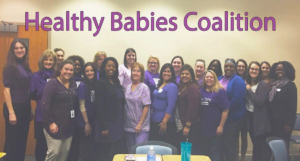 As one of the graduate assistants on the Healthy Babies Coalition in Waco, I have had the amazing opportunity of serving this growing community alongside organizations and agencies devoted to the health of women and children. These agencies truly make up the backbone of Waco. They work hard without the publicity, fame, or acknowledgment they deserve. The Healthy Babies Coalition started from the Healthy Texas Babies Initiative, an initiative of the Texas Department of State Health Services developed to help Texas communities lower their infant mortality rates. Waco is in the top 10% of highest infant mortality rates in Texas, and the Healthy Babies Coalition is determined to fight these terrible odds. Our community initiative includes partnering with agencies to create a plan for inter-conception health information to be provided to clients, encouraging the creation of a reproductive life plan with clients, as well as encouraging clients to see their physicians and enter in to early prenatal care.
As one of the graduate assistants on the Healthy Babies Coalition in Waco, I have had the amazing opportunity of serving this growing community alongside organizations and agencies devoted to the health of women and children. These agencies truly make up the backbone of Waco. They work hard without the publicity, fame, or acknowledgment they deserve. The Healthy Babies Coalition started from the Healthy Texas Babies Initiative, an initiative of the Texas Department of State Health Services developed to help Texas communities lower their infant mortality rates. Waco is in the top 10% of highest infant mortality rates in Texas, and the Healthy Babies Coalition is determined to fight these terrible odds. Our community initiative includes partnering with agencies to create a plan for inter-conception health information to be provided to clients, encouraging the creation of a reproductive life plan with clients, as well as encouraging clients to see their physicians and enter in to early prenatal care.
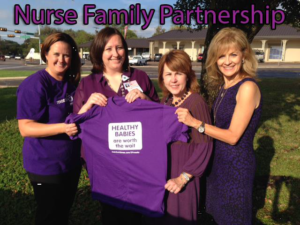 One of the members of the Healthy Babies Coalition working on these goals is Nurse Family Partnership (NFP). These loyal nurses of NFP are concerned above all about the relationships between mothers, children, and nurses. They are now performing home visits in Waco for first time mothers who qualify for these benefits. The goals of the partnership are to improve pregnancy outcomes, improve child health and cognitive development, and improve economic self-sufficiency. These nurses want to serve the moms and children of Waco in their home environments where they are the most comfortable. Not only does this eliminate the money and time of traveling for the new moms, but it also allows the nurses to teach and guide moms in an intimate setting through healthy pregnancies, labor, delivery, and motherhood.
One of the members of the Healthy Babies Coalition working on these goals is Nurse Family Partnership (NFP). These loyal nurses of NFP are concerned above all about the relationships between mothers, children, and nurses. They are now performing home visits in Waco for first time mothers who qualify for these benefits. The goals of the partnership are to improve pregnancy outcomes, improve child health and cognitive development, and improve economic self-sufficiency. These nurses want to serve the moms and children of Waco in their home environments where they are the most comfortable. Not only does this eliminate the money and time of traveling for the new moms, but it also allows the nurses to teach and guide moms in an intimate setting through healthy pregnancies, labor, delivery, and motherhood.
As a young mother, Andrea noticed that “There isn’t a class in school that tells you how to raise a kid. Nurse- Family Partnership is like an instruction book that gives you the knowledge and positive encouragement to raise a baby.”
Fathers are just as important as mothers in the pregnancy and child-rearing stages of life, and NFP honors the fathers of these families tremendously. Research shows that families who participate in NFP have a 68% increase in having a father in the household because this program knows the major benefits to fathers and children in that growing relationship.
As of this writing, the nurses in McLennan County plan to start visiting homes in January 2016. They are taking referrals for first time mothers who are due after March 10, 2016 and/or before the end of their 28th week of pregnancy. In addition, mothers must qualify for Medicaid or fall below 185% of the poverty line.
Nurse-Family Partnership of Waco is located at 120 Hillcrest Medical Boulevard #303, phone number 254-202-1130. Visit their website in English and Spanish at http://www.nursefamilypartnership.org/ to hear more personal stories and testimonies of the thankful mothers who have participated thus far and to connect with the program in Waco.
 Alyssa Holloway moved to Waco in August 2015 from Santa Barbara, California and loves her community. She is studying for her Masters in Social Work at Baylor University, and is working with the Healthy Babies Coalition at the Waco-McLennan County Public Health District. She enjoys baking, running, being outside, reading, laughing, going to church, and traveling.
Alyssa Holloway moved to Waco in August 2015 from Santa Barbara, California and loves her community. She is studying for her Masters in Social Work at Baylor University, and is working with the Healthy Babies Coalition at the Waco-McLennan County Public Health District. She enjoys baking, running, being outside, reading, laughing, going to church, and traveling.
The Act Locally Waco blog publishes posts with a connection to these aspirations for Waco. If you are interested in writing for the Act Locally Waco Blog, please email [email protected] for more information.
by Kayla Zollinger
Many people think of Communities In Schools of the Heart of Texas as a school based program where our staff are positioned at campuses throughout the Heart of Texas serving K-12. What many people do not realize is that CIS-HOT also serves youth and young adults who are often referred to as “opportunity youth.” Opportunity youth are typically defined as individuals 16-24 year-olds that are not working or in school. In partnership with Workforce Solutions for the Heart of Texas, CIS-HOT aims to connect with opportunity youth and work with them to achieve their education and employment goals.
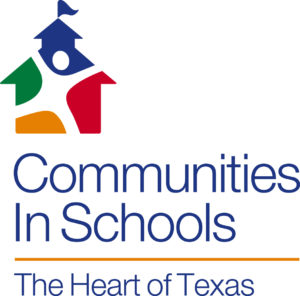 One of the opportunities offered to our 16-24 year olds participants is a Subsidized Work Experience. Through this experience, CIS-HOT hires youth, provides them with new-hire training, and places them in the community at a host-worksite. These host-worksites provide the youth with a job description, daily tasks, and supervise them for 15-20 hours per week for about ten weeks, or up to 300 hours. Youth participating in the Paid Work Experience Program receive an hourly wage paid by CIS-HOT as well as support from an individual Career Coach. Each Career Coach meets with the host employer and participant weekly to discuss the participant’s performance in order to highlight strengths and identify areas of growth to prepare them for future employment success.
One of the opportunities offered to our 16-24 year olds participants is a Subsidized Work Experience. Through this experience, CIS-HOT hires youth, provides them with new-hire training, and places them in the community at a host-worksite. These host-worksites provide the youth with a job description, daily tasks, and supervise them for 15-20 hours per week for about ten weeks, or up to 300 hours. Youth participating in the Paid Work Experience Program receive an hourly wage paid by CIS-HOT as well as support from an individual Career Coach. Each Career Coach meets with the host employer and participant weekly to discuss the participant’s performance in order to highlight strengths and identify areas of growth to prepare them for future employment success.
At CIS-HOT we find that so many of the youth entering our program have a strong desire to work, and want to learn to be reliable employees, but they often need the support of a caring adult to encourage and guide the learning of soft-skills. These youth and young adults are often juggling multiple responsibilities like working toward a GED, attending credit recovery classes, parenting, searching for employment, and even probation. This program offers them the opportunity to attend class, gain job skills, and earn a wage while being surrounded with the CIS-HOT community of support.
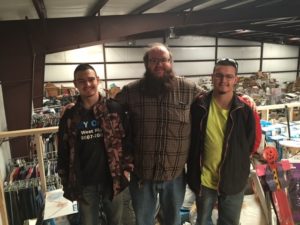 Through this program, we have seen numerous changes in our participants including higher self-esteem, more confidence, greater communication, increased punctuality, and improved initiative. Our team has found that this opportunity to learn, work, and earn a wage has kick-started the participants’ intrinsic drive to be successful. Many participants have now moved on to new permanent employment opportunities, using the work experience as an important resume item, and several have enrolled in post-secondary education. We have seen the work experience ignite confidence in youth and young adults and awaken the realization that their goals are within reach.
Through this program, we have seen numerous changes in our participants including higher self-esteem, more confidence, greater communication, increased punctuality, and improved initiative. Our team has found that this opportunity to learn, work, and earn a wage has kick-started the participants’ intrinsic drive to be successful. Many participants have now moved on to new permanent employment opportunities, using the work experience as an important resume item, and several have enrolled in post-secondary education. We have seen the work experience ignite confidence in youth and young adults and awaken the realization that their goals are within reach.
One of the most integral components of the Paid Work Experience Program at CIS-HOT is the support and investment in the lives of the youth participants by our host employers. Our host employers act as the main supervisors for the youth participants throughout their Work Experience. On a daily basis, these host employers offer professional advice to our participants, and thus doing, contribute to the successful future of these participants. Host employers can be from the public, private, or non-profit business sectors and have the opportunity to hire participants for any open positions following the completion of the Work Experience. Recently, we asked some of our host employers what they would say to other employers in the community about participating as a worksite and here is what they said:
“It is a great experience not only for the student, but also for the employer!”
“I’d say, ‘Do it!’ This program is fantastic for both the student and the employer. To be the first example and somewhat shape and improve a child’s future is an awesome feeling! Both participants walk away feeling accomplished. It’s a Win-Win situation!”
“The CIS Staff is great to work with, and very knowledgeable in what they are doing. The applicants they send us are wanting to change their circumstances.”
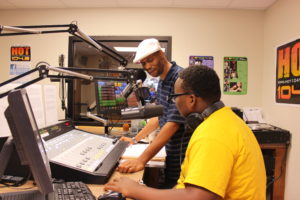 CIS-HOT is so thankful for the numerous employers who are currently hosting participants and who have acted as hosts in the past! You are truly valued and your investment in our youth and young adults will impact them for years to come!
CIS-HOT is so thankful for the numerous employers who are currently hosting participants and who have acted as hosts in the past! You are truly valued and your investment in our youth and young adults will impact them for years to come!
If you are interested in serving as a host employer for the Communities In Schools of the Heart of Texas Work Experience Program or if you would like to recommend a young adult to the program, please contact Kayla Zollinger.
 Kayla Zollinger is the Field Coordinator for the Workforce Innovation and Opportunity Act Program at Communities In Schools of the Heart of Texas. A resident of Waco since 2008, she has earned both a BBA, and an MSW from Baylor University. She is an avid Baylor Football fan with a passion for working with youth and young adults in her community. You can contact Kayla at 254-640-7299 or [email protected].
Kayla Zollinger is the Field Coordinator for the Workforce Innovation and Opportunity Act Program at Communities In Schools of the Heart of Texas. A resident of Waco since 2008, she has earned both a BBA, and an MSW from Baylor University. She is an avid Baylor Football fan with a passion for working with youth and young adults in her community. You can contact Kayla at 254-640-7299 or [email protected].
The Act Locally Waco blog publishes posts with a connection to these Aspirations for Waco. If you are interested in writing for the Act Locally Waco Blog, please email [email protected] for more information.
By Jennifer Alumbaugh, LMFT
I’ve had a few, what I like to call “Job years” in my life, those seasons when the hits just keep on coming and I’ve barely recovered my breath from one loss while I’m learning of the next one.
I had my first Job year when I was 8/9: my parents got divorced, my favorite kindred Aunt passed away, my childhood best friends and neighbors moved away, I moved to a new city and school, and my mother got remarried. That year—actually, that all occurred within a nine month span—left a lot of gaping holes in my 9 year old soul, and aged me a few decades as well.
I went to a support group for kids who experienced loss of a parent via death or divorce and met a friend with whom I became close and stayed friends over the years through high school and a while beyond. She had lost her father to cancer. We talked about loss and grief and connected over understanding the kinds of things at our age many other kids didn’t.
“Be with those who also are grieving. As you tell your stories, you will share an understanding of the heart that is deeper than words.” –Karen Katafiasz
After college I moved to Texas to be a foster mother at a youth ranch. For the first few months I lived in a staff house and was on a 4-day rotation in a house for middle-school age girls. Six months after I moved my life to Texas, I and a few other staff members lost everything in a fire that consumed our living quarters. It was a different kind of loss—of things, material possessions—no people were hurt or killed in the night time blaze. But it left a scar that I still feel today, when I forget and look for that one shawl my grandmother gave me, or those photos from college, or the first quilt I ever sewed. The Red Cross voucher couldn’t replace those things.
Six months after the fire, I was parenting in another home. This time on my own in a house of eight high school aged girls. The girls had just given me my first Mother’s day that Sunday, complete with wildflowers picked on the walk home from church and grilled cheese lunch they insisted on making me and hand written cards. May 15, 2002. Wednesday. Two of my girls and one of the boys from the other house borrowed a friend’s car, skipped afternoon classes, and drove into town. I was told they were going so fast they died on impact, in an instant. That weekend I buried three children in three days.
Last year, I lost several family relationships including contact with my young nieces and nephew who I came to Waco to help raise during my brother-in-law’s deployment. These bonds were severed due to the effects of my brother-in-law’s Narcissistic abuse and other toxic power and control dynamics among family members.
My life has been marked by some profound circumstances of loss and grief. While there have also been extraordinary joys and life scattered throughout, I began learning early on that there is no returning to the way things were, there is only moving forward, with the pain, to create a new normal.
“There will come a time to remind yourself of your reasons for living. You have a future worth enduring for, and you deserve to find a renewed sense of purpose and pleasure in your life.” –Karen Katafiasz
What that looks like is different for everyone. Around the world various cultures and beliefs have a vibrant array of ritual, ceremony, and celebrations to remember the dead, to honor those who have crossed over before the rest of us. For some, solace is found in spiritual practices and the comfort of faith beliefs and communities. For others, peace is sought in living out legacies of those passed on. Some grieve loudly, with wailing and heaving sobs unbridled. Others sit Shiva, quietly contemplating, in their homes. Some wear the clothes of mourning, muted solemn hues; others don vibrant colors celebrating lives lived, joys relished, with light and music and laughter.
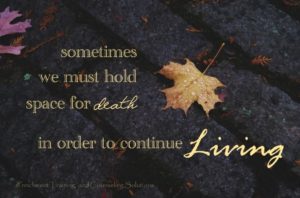 Some losses are private, secret, taboos whispered about in hushed tones and behind closed doors. Some losses are splattered across front-page news, a community outrage, a public nightmare unending. Some losses are respected, others are judged, some are shamed, others are “good-riddanced.” But every loss is someone’s. And I believe we must hold space for death—of a person, a relationship, a dream, a hope, a moment, a creature, an identity—in order to continue living.
Some losses are private, secret, taboos whispered about in hushed tones and behind closed doors. Some losses are splattered across front-page news, a community outrage, a public nightmare unending. Some losses are respected, others are judged, some are shamed, others are “good-riddanced.” But every loss is someone’s. And I believe we must hold space for death—of a person, a relationship, a dream, a hope, a moment, a creature, an identity—in order to continue living.
If you’re like me and you’ve survived a loss or three or many, you’ve also endured the onslaught of usually well-intentioned but so often hurtful sayings and prescriptions shared by those on the outside of our suffering. In retrospect I can appreciate their good intentions, but in the moment, those words strike as swift and deep as arrows and their aching effects can linger for a long while after.
The truth is, there is no right or appropriate way to move through our experiences. The process, as much as our experience, is unique to each of us. What resonates with one, rubs another uncomfortably. What nourishes one, may set back another. There is no timeline, no expiration date, no ordered and linear path out and past grief. We grow familiar with it. Accustomed to the weight and shape of it in our lives. And around this reality, we begin piecing together a new us, a new life, a new rhythm.
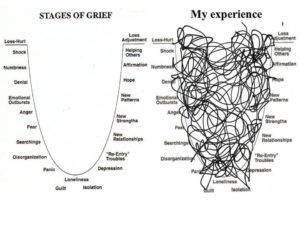 Elizabeth Kübler Ross gave us some language for discussing loss with her classic Five Stages of Grief (denial, anger, bargaining, depression, acceptance), yet many of us—professionally and personally—have come to realize that 1) there are many more than five parts and 2) they seem more like facets or stations at which one may visit multiple times along their journey through loss and grief. Personally, I find myself looking much more like the depiction on the right than any kind of neat, discernable, or graceful movement. (Picture source).
Elizabeth Kübler Ross gave us some language for discussing loss with her classic Five Stages of Grief (denial, anger, bargaining, depression, acceptance), yet many of us—professionally and personally—have come to realize that 1) there are many more than five parts and 2) they seem more like facets or stations at which one may visit multiple times along their journey through loss and grief. Personally, I find myself looking much more like the depiction on the right than any kind of neat, discernable, or graceful movement. (Picture source).
While there is no one formula for expressing grief, there are both healthy and unhelpful ways of coping with our feelings in the wake of loss. As a therapist, life coach, friend, and fellow mourner, I have sat with people of all ages, beliefs, cultures, and backgrounds through some of the darkest moments in life. I’ve sat with myself through them. In my experience, the most harm we can do is to ignore the feelings and to avoid talking about it. I know. It is scary and difficult and painful. Sometimes our losses shake and shatter everything we have come to believe, and in our grieving, we must rebuild what was razed to the ground.
I also know the beauty that can come from sharing the process with others—in therapy, in coaching sessions, in support groups, in creative outlets—we may find that in those moments when we feel we have been left with nothing, our words offer a light and a hope to another. And out of nothing, we find, a resilient something. There can be profound healing in a validating, “me too” of another sitting with us on our mourning bench. If you are finding yourself in this place, whether it is with a pastor, rabbi, elder, priest, counselor, life coach, friend, support group, mentor, therapist, or other trusted ally, I encourage you to seek the companionship of others along your journey through grief, loss, and finding a new normal. It is one path you don’t have to walk alone.
Resources:
- Holding Space – an ongoing, weekly grief and loss support group @ Enrichment Training & Counseling Solutions. Saturdays (March 5th) 10a-11:30am. Includes learning, creative projects, and guided discussion. Facilitated by Jennifer Alumbaugh, MS. Register here.
- GriefShare 12–week groups
- Providence Healthcare Network Support Groups
 Jennifer Alumbaugh, MS is a Licensed Marriage and Family Therapist providing clinical and professional development consultation services at Enrichment Training and Counseling Solutions. She has extensive experience working with adolescent and adult survivors of psychological and spiritual abuse, trauma (sexual violence, childhood trauma, interpersonal violence); and complex PTSD. These, along with grief and loss work are her areas of specialization. Jennifer practiced as a mental health clinician throughout Los Angeles County working with children, youth, and their families from 2007-2012. In Central Texas, Jennifer has worked as a Site Coordinator with Communities in Schools of The Heart of Texas at G.W. Carver Middle School; as an independent consultant and professional development trainer; and conference speaker. In 2016 Jennifer created an implemented a therapeutic creative writing program, Brave Young Voices, at Klaras Center for Families and at the Texas Juvenile Justice Department correctional campus at Mart, TX. She may be reached at: [email protected] or 254-405-2496.
Jennifer Alumbaugh, MS is a Licensed Marriage and Family Therapist providing clinical and professional development consultation services at Enrichment Training and Counseling Solutions. She has extensive experience working with adolescent and adult survivors of psychological and spiritual abuse, trauma (sexual violence, childhood trauma, interpersonal violence); and complex PTSD. These, along with grief and loss work are her areas of specialization. Jennifer practiced as a mental health clinician throughout Los Angeles County working with children, youth, and their families from 2007-2012. In Central Texas, Jennifer has worked as a Site Coordinator with Communities in Schools of The Heart of Texas at G.W. Carver Middle School; as an independent consultant and professional development trainer; and conference speaker. In 2016 Jennifer created an implemented a therapeutic creative writing program, Brave Young Voices, at Klaras Center for Families and at the Texas Juvenile Justice Department correctional campus at Mart, TX. She may be reached at: [email protected] or 254-405-2496.
The Act Locally Waco blog publishes posts with a connection to these Aspirations for Waco. If you are interested in writing for the Act Locally Waco Blog, please email [email protected] for more information.
